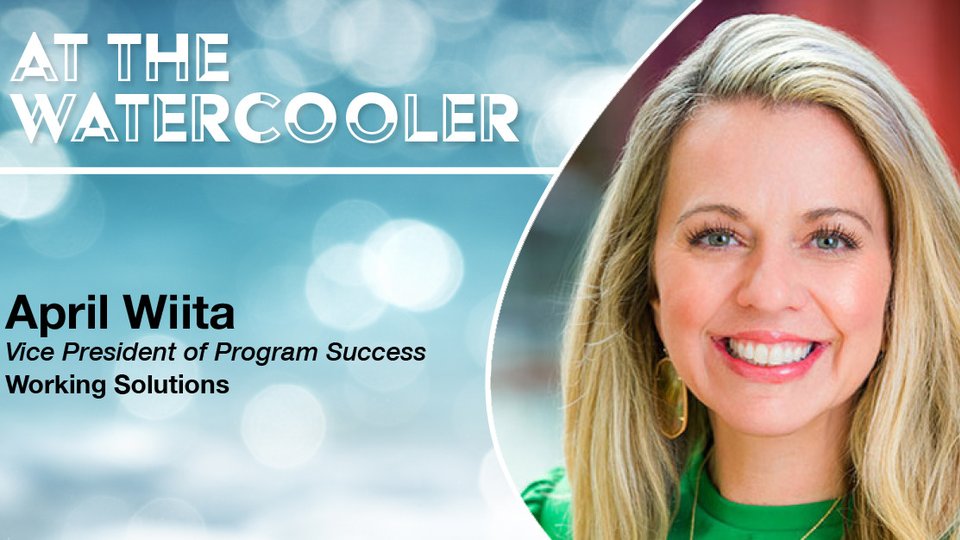At The Watercooler
At the Watercooler with April Wiita of Working Solutions
April Wiita, VP of program success at Working Solutions, said her role includes enabling clients to reinvent in place to keep pace — and outdistance the competition.

July 25, 2023 by Judy Mottl — Editor, RetailCustomerExperience.com & DigitalSignageToday.com
Describe your current role:
As the vice president of program success, I direct the day-to-day, customer experience operations with name-brand clients, front-line teams and an agent network of 150,000-plus professional service and sales reps in North America. In addition, I lead the development of corporate objectives, strategic planning, implementation of best practices, key performance indicators and execution of continuous-business improvement. I am responsible for the direct management and performance of the CX teams, customer satisfaction and growing revenue — both organically on client programs and generating new business. I play an integral role in sales pursuits, offering prospective clients insight into our service excellence.
As a trusted advisor, I have opportunities to consult and help solve client problems and advance our company's industry leadership. For us, operations is where the rubber meets the road. On client programs with multiple service providers, Working Solutions often is ranked #1. In fact, its excellent performance becomes the benchmark for in-house CX teams and external providers. We lead by example, getting better as we go.
What do you enjoy most about your current role?
Working with people who care about, and for, clients and their customers. It's 100% all about them. At times, the days can be long and challenging, but being with professionals makes it all worthwhile. The easiest way to get over a bad day is to surround yourself with people you value, respect and care for. A positive perspective instantly changes your outlook — and the outcomes.
What's a common misconception people have about what you do?
Too often, businesses see customer service as overhead. An expense to be cut. A nice-to-have — until. Just look at how customer service tanked during the pandemic. And it hasn't really come back, has it? In the current economy, service operations are being squeezed by record inflation and a pending recession. News flash: Knee-jerk constriction is not a growth strategy. Thinking CX cutbacks are smart is a grave misconception and an even worse miscalculation. Subpar service and sales can cost companies business, now and later. Plus, they diminish the value of their brands today and for the long term.
Research shows how customers want great service and experiences — and are even willing to pay more for it. Service excellence differentiates organizations, especially in tough times. So, it is ill-advised to abandon great CX in the face of downturns. Because poor service is a turnoff to current customers and a handicap to future business. In my role, I partner with clients to streamline operations and maximize results. In hard times, we explore new ways to capitalize on CX to keep their current customers and garner more business. Enable clients to reinvent in place to keep pace — and outdistance the competition. We play the long game for a long gain. Quality service and sales are investments in the future today.
Who is/was your mentor and what's one important lesson you learned from them?
As an industry veteran of more than 25 years, I have had some amazing mentors along the way. The most impactful one didn't even realize she was shaping my future, or the way I would do business and conduct myself as a leader. She was my mentor for many years — and my grandma for life. In the early 1980s, my grandma was part owner of a motel in our small town. She decided it was time to branch out and add to her business. She was the first in our area to add a video store. Yes, old-school VHS players and videos. She paved the way for many others to follow.
My grandma put her customers first and she prided herself on repeat business, customer satisfaction and putting a personal touch on all interactions. Looking back almost 38 years later, it's crazy to me how advanced she was and didn't realize it. (Or maybe she did.) She created a customer-rewards program, gained efficiency on her reservation process, and always kept her customers coming back for more. There were no fancy tools or technology. Often, the work was done with punch cards, pen, paper and passion. While many large video stores came to the area, grandma had a loyal customer base that never stopped coming to her store until she retired. She taught me the beauty of servant leadership. That quality was reflected in her ability to put people first, lead her small, but mighty team, and give back to her community.
What industry trends do you think don't get enough attention and why?
Today, there is a lot of talk — and I wouldn't call it hype — about advances in AI-enabled customer service. Automated CX is a driving force in the contact center industry today. Customers like the ease of serving themselves — with a simple click, swipe or voice command. But as every consumer knows, artificial intelligence — for all it's touted — only goes so far in the real world. For complex interactions, intelligent agents are needed. Tech-skilled and business-savvy, they pick up where AI leaves off.
And regardless of the situation, simple or complex, customers now expect the Holy Grail of customer service every time — seamless experiences. That's why Working Solutions blends the two — AI and IA. Technology and analytics that support the delivery of excellent customer experience. Not instead of, but as a foundation to enhancing every interaction. Automation for speed and efficiency. Agents for sophisticated, empathetic solutions. An example would be dealing with global distribution systems — Amadeus, Sabre and Travelport — to book business trips. But even with the best systems, customer issues can still arise. Say, a traveler being stranded at Chhatrapati Shivaji Maharaj International Airport in Mumbai during a monsoon. Which means: Agents must be able to not only know the situation and system — but also know the workarounds to make it all work.
Where did you grow up and how did your upbringing impact the person you are today?
I grew up in a small town in Northern Wisconsin. The feeling of community is something that has shaped me into the person I am today. I lost my Mom at a young age. When I moved back home to help tie up loose ends and care for my family, I was blown away at the support received from so many. I had complete strangers rally in my corner and help my family through a tough time. I have taken that feeling of community and goodwill with me through the years, always trying to lift others up and offer support. I believe it to be true that people do not care how much you know, until they know how much you care. The caring factor is key to humanity and leadership.
What's one interesting thing about you that even the people you work with every day probably don't know?
I love old things — from the smell of old books to the look of a little rust to the feel of old wood. Enjoy taking a piece of furniture, which someone deemed trash, and taking time to restore it. Like the challenge of taking a project that seems hopeless and giving it new life. Give me something old and I will show you something new.
Is there anything else you would like to tell people about yourself or your company/organization?
The bane of the contact center industry is attracting and retaining skilled agents. This historic problem intensified during the pandemic, with millions of job openings and millions more workers retiring. Even today, these are tough times for clients seeking to sustain great customer service. Realizing the severity of the situation, the operations team at Working Solutions recalibrated the flexibility of its on-demand workforces, making them even more responsive to client needs. Agents are grouped into three classifications:
- Steady – 20 hours a week/the Steady Eddies or Ediths.
- Flex – 30+ hours a week/open to work more.
- Reserve – 10 hours a week during peaks/assigned to one account/work open seasons.
For clients, the benefits are two-fold:
- Lower workforce attrition, well below the contact center industry average.
- Longer agent tenure, averaging almost three years. Bonds agents more with a client's business.
Read more about April's approach to customer success.
To learn more about Working Solutions click here.
"At the Watercooler" is an advertorial series that allows our readers get to know industry leaders like you. Learn more. |

 ChatGPT
ChatGPT Grok
Grok Perplexity
Perplexity Claude
Claude




